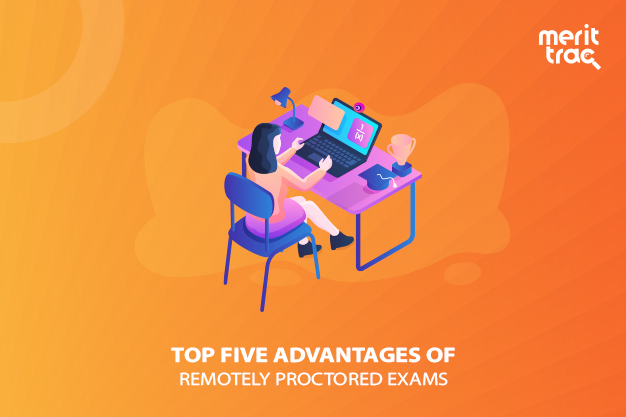
Top Five Advantages of Remotely Proctored Exams
Date: 11/08/2020 | Category: Entrance Exams , Examination , Education , Online Examination
National Testing Agency (NTA), the government testing body, on July 22, 2020 conducted the first Indian Scholastic Assessment Test (IndSAT) under Study India Program announced in the last Union Budget. IndSAT is an eligibility test for granting scholarship and admission to foreign students to study in Indian universities. Students from 12 countries across the globe took this test, which was held completely online in remote-proctored mode.
The Law School Admission Test (LSAT), an entrance test for admission in various law schools and universities across India, has been conducted by the Law School Admission Council (LSAC) in the month of July as well. The traditional pen-paper exam was transformed into an online test with remote proctoring and over 6000 students took the exam. Even the National Law University (NLU) Delhi is also going to conduct All India Law Entrance Test on 18th August in the remote proctored mode.
On the outbreak of COVID-19, digital learning and teaching became a new norm. The examinations are also becoming digital. The most crucial anxiety is efficiently organizing the examination process that matches the standard of an offline examination. The major challenge is ensuring a foolproof examination by reducing the frauds at the side of exam takers. Traditionally, an invigilator monitors the students at an exam hall to check if any fraudulent methods are being adopted.
AI-powered remote proctored exams is helping institutions overcome these anxieties. Remote proctoring mode enables authorities to monitor students remotely while they take exams. There are mainly three types of remote proctoring – live online proctoring, recorded proctoring and advanced proctoring. While the first two require the involvement of an actual person, the advance proctoring eliminates human involvement. The application of artificial intelligence algorithm helps to improve the efficiency of proctoring. The AI-enabled remote proctoring undertakes all the activities from verifying the candidate identity with face recognition to removing the copy-paste option. It also limits the access to a particular IP address and monitors movements of mouse and candidate.
Globally, the demand for remote proctoring has increased fivefold after the pandemic outbreak. India too witnesses an increase especially after the UGC direction to hold term-end exams by the end of September 2020. Let’s quickly take a look at the five advantages of remote proctoring-
- Agility
The examination is a time-consuming process and involves many steps and people. The online examination can be conducted without wasting time and efforts of several people. Remote proctoring improves the process by reducing the involvement of individuals to invigilate the students. This makes the examination more agile. Since it eliminates the presence of individuals, the candidates from remote locations can also take the exam.
- Security
To secure the examination, educational institutions need to take extra caution and spend money at various steps. Since the online examination system alone checks the untoward incidents, the institutions can stop worrying about the lack of efficiency. Remote proctoring is a reliable solution to secure the entire exam administration.
- Scalable
The advanced remote proctoring enables to conduct the online examination in mass scale. The candidates can participate in the exam from their own personal devices and the system restrict the access to IP addresses and monitors individual exam taker. There is no issue of space constraints or human resource to administer the test.
- Fast delivery – exams, evaluation & results
As discussed above, the agile online examination platform helps institutions quickly deliver the exams. The exam software combined with remote proctoring also intensifies the evaluation and result declaration. The system can evaluate the answers automatically in the case of objective type questions and the result can be declared as soon as the candidate finishes the exam. Even for subjective type questions, the evaluation can be done with a few clicks and declare result.
- Cost-effective
As the involvement of a large number of invigilators is eliminated, the institutions can marginally reduce the cost of conducting examinations. The institutions only need to invest money in the online examination software with remote proctoring service. Uploading questions and details of candidates into the software is the only steps involved in the process before the examination.
These are some of the advantages of the online examinations coupled with remote proctoring. The pandemic crisis and the lockdown has affected the term-end exams as well as entrance examinations in educational institutions.
Embrace the future of assessment
MeritTrac, India’s leading assessment and testing company, offers a cutting-edge solution to carry out the examinations in the tiring time, with its end-to-end exam software Pariksha. The educational institutions can choose any of the three following modes:
- Remote Online Exam on MeritTrac Pariksha with Safe Exam Browser (SEB) – Sufficient level of security
- Remote Online Exam on MeritTrac Pariksha with Auto Proctoring and/or SEB – High level of security
- Remote Online Exam on MeritTrac Pariksha with LIVE Proctoring and/or SEB – Highest level of security
In short, by securing examinations, remote proctored exam mode is increasing the reliability of the online assessment, which is bracing to be future of assessment and testing. A simple investment in the remote proctoring mode gives wide-range of advantages and reduces many hurdles in exam administration.













 Sales Hotline: USA: +1 646 916 0939 / Others: +91 80619 14700
Sales Hotline: USA: +1 646 916 0939 / Others: +91 80619 14700


